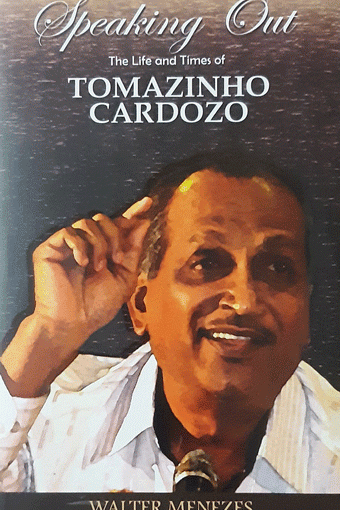Reviewed by Agnelo Pires
BIOGRAPHIES are written to explain or explore the greatness of the great! It is said that three things can change a person’s life — suffering, dreams and love. This is exactly the essence of the book titled ‘Speaking Out, The Life and Times of Tomazinho Cardozo’ by Walter Menezes. The biography was released on the occasion of Tomazinho Cardozo’s 75th birthday by the Dalgado Konkani Academy, it is published by Broadway Publishing House (Panaji) and priced at Rs300.
Tomazinho is colourfully painted by Dr Nandakumar Kamat in his Preface to the book: “Tomazinho is a multifaceted personality, a loving son of a loving mother and loving brother of a loving sibling, an educationist, a writer, a politician, an institution builder and so on…”
My association with Tomazin bab dates back to the late 80s when Dalgado Konkani Academy was formed. Meeting him culminated into a strong friendship which still continues. What I have noticed from close quarters during this time is that whoever goes to Tomazin bab with any problem, that problem does not remain a problem anymore! The door of his home called Asro (Shelter) at Candolim is always wide open for friends and foes alike, although it is hard to say if he has any foes.
Tomazinho has worn many hats and this has made him a household name in every nook and cranny of Goa and beyond its boundaries. He has tasted success, albeit in a hard way, as life has not always been a bed of roses for him, and this is depicted by the author in Chapter 2 and 3 of the book. But the days that break you are the days that make you.
In him are the sounds of the beating heart of a writer, dramatist, social worker, teacher and a politician, all bundled up in one character, and this is well synchronised by the author in Chapter 4 until chapter 10. Here is a true story to do with as much politics as literature and family where humility is tested and tried — but eventually love and endurance conquers.
The book skilfully, lucidly covers Tomazinho’s upbringing, challenges and achievements in a triangle of personal, professional and political realm. The people who stood by him through thick and thin like the Gibraltar Rock, include his sister, and especially his elder brother Joao (who last week knocked on heaven’s door, leaving an immeasurable void in his life), surfaces quite often in his narrative.
As an MLA, Tomazinho has always stayed on the straight and the narrow. ‘This is one area where he found himself total misfit. With values like sincerity and honesty at the top of his priority, the thought of corrupt practices never crossed his mind,’ the author says, thus makes it whiter than white about Tomazinho’s character without sugar-coating him but instead giving the impression that hardcore politics was not his cup of tea.
Like a Google Map App that makes your journey pleasant and informative, the book is filled with meandering reflections on Tomazinho’s life journey through the green pastures of felicity and fame, awards and accolades, people and politics and pen and poetry. The strength of a writer and the weaknesses of a politician are also artistically woven into a colourful fabric by the biographer.
Unfortunately, the life and times of such a person of multitudinous qualities, seems crammed and this is showcased in just 12 chapters of the 204 pages making up the book. There’s some unwanted info on Acharya Atre (p.50) and on anti-defection laws (p.153), on the House of Commons (p.157) – all this could have very well been omitted to make more space for the love of Tomazinho — his better half, Irene bai.
The allegations against Tomazinho regarding the language agitation and Roman scripts are deafening and still find him caught in a sordid web of misunderstanding, though he makes a clean breast of himself saying that he has been made the fell guy by the protagonists of Devnagri scripts, namely Pundalik Naik, Damodar Mauzo and Uday Bhembre. When all these renowned writers are in the land of the living, their side of the story could have balanced the scale in Chapter 11 titled `Bitter Twists of the Tongue.’
During Tomazinho’s tenure as Speaker of the House, Goa saw many a Catholic as chief minister. It is also alleged that he could have rendered justice to the Roman script in flesh and spirit during this time by galvanising support in favour of a change in the Official Language Bill and regarding Konkani awards given by the Sahitya, Kala and Konkani academies.
One is reminded of Jean Paul Sartre’s words, “Every word has consequences. Every silence, too.” Why the script controversy was never resolved is best known to Tomazinho and the lamp post. But hopefully it will surface one day in the next edition of this biography or perhaps in his autobiography!
And yet Tomazinho with many strings to his bow will always remain a larger than life model of integrity to readers of his biography. Much has been done by him for Konkani language and culture but much more remains undone. He may not have received a Sahitya Academy or Kala Academy award for literature or a Padma Shree for all his immense contributions as yet — but a road named after him in Candolim is by itself a milestone.
With two books in Konkani to his credit, Mr Walter Menezes carves one path forward with this first in English, without a shadow of doubt. As the monk of the monastery of his thoughts, Mr Menezes has written in a mesmerising style to capture the reader’s attention on page one with the prologue, imprisoning and holding it throughout. Though a sort of a panegyric, the book deserves accolades as it provides the reader with a certifiable gem.
All in all, it’s worth investing one’s time in taking a leisurely walk down the flowery lane of each page of this book.
